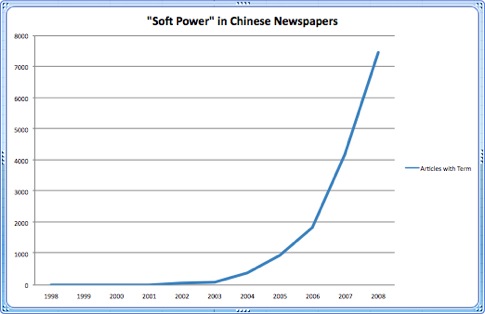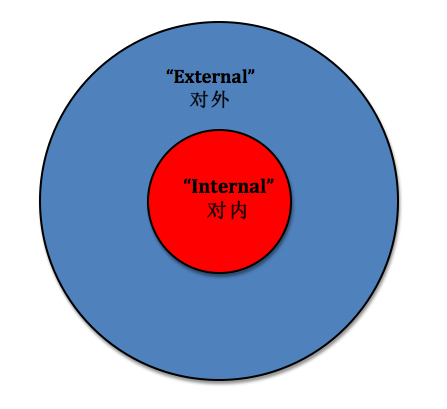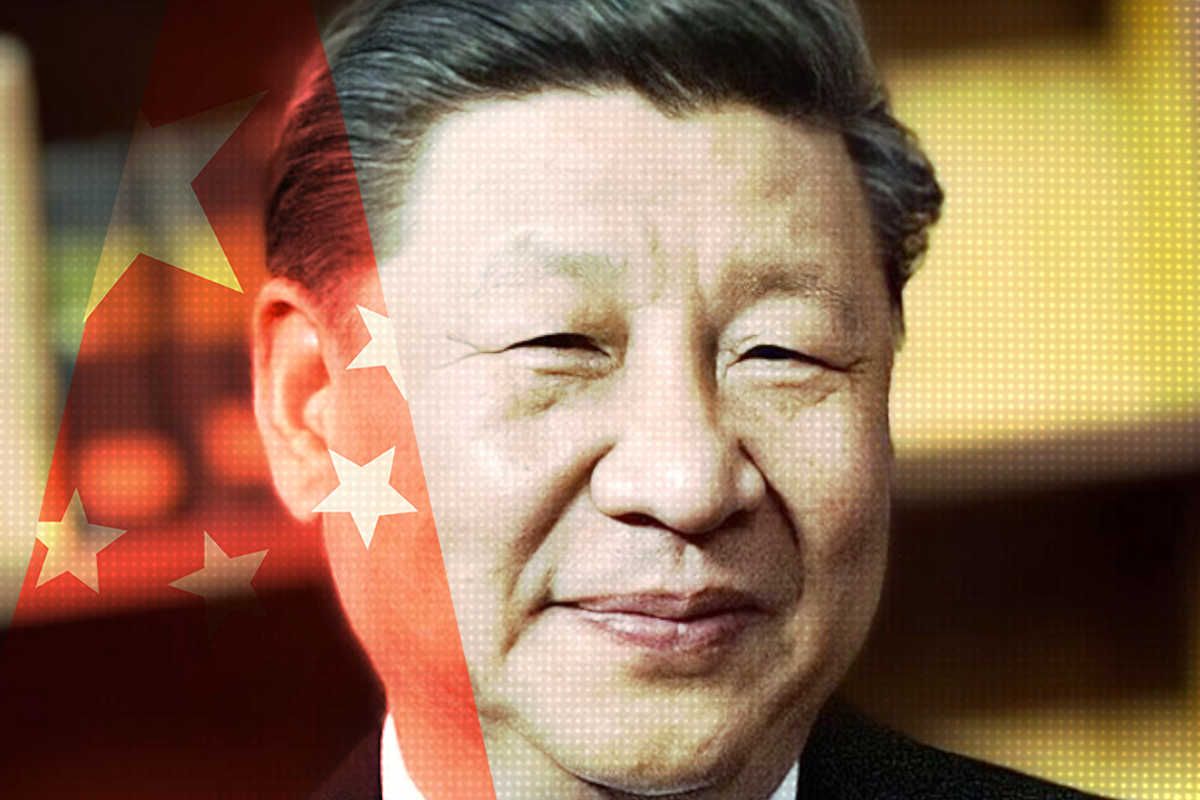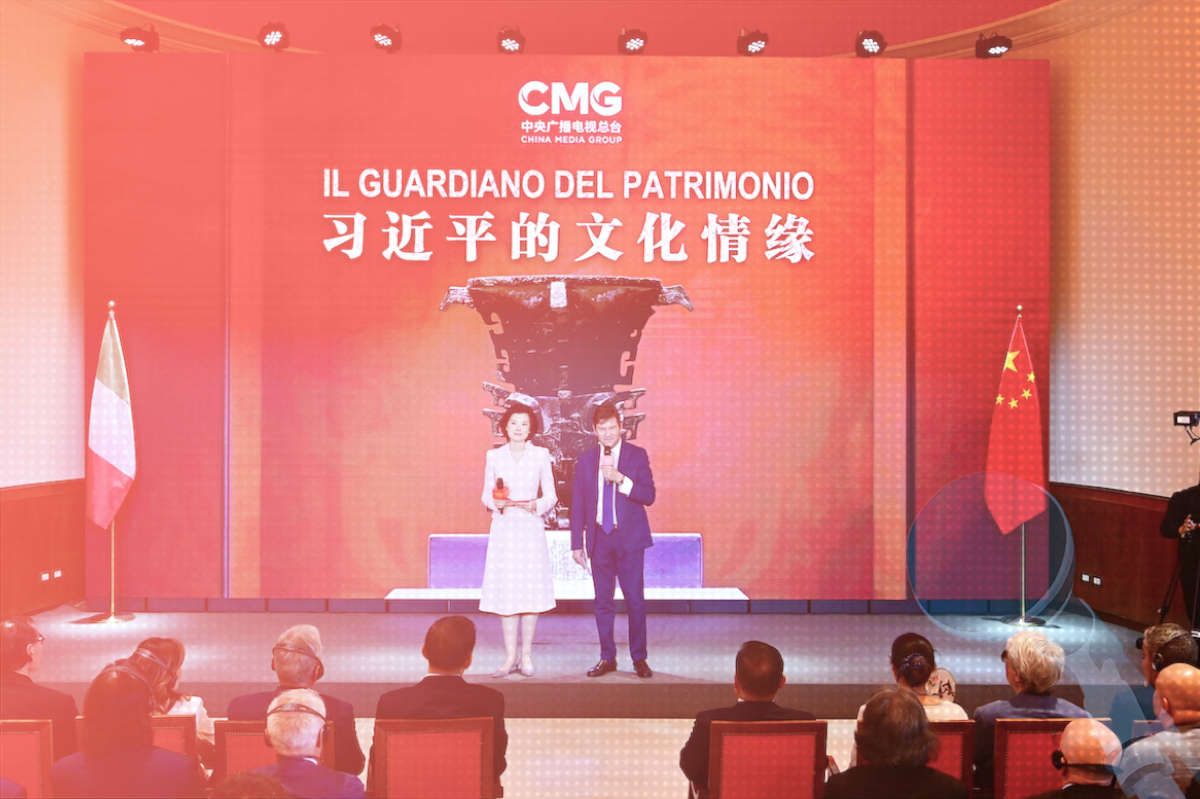Headlines and Hashtags
Is China's new communications worldview coming of age?
By David Bandurski — In China, the term “soft power” (软实力), coined by political scientist Joseph Nye in the late 1980s, took some time to gain traction. But since emerging in official party newspapers in late 2001, the idea — and the project — of “soft power” has become something of an obsession. This is true not only in the field of international relations but in the arena of journalism and mass communications as well.
The first use of “soft power” in China’s official party media came on November 15, 2001, in Guangming Daily, a newspaper published by the Central Propaganda Department.
The article in question celebrated China’s successful bid to host the 2008 Olympic Games, and concluded:
In sum, the true nature of the “humanistic Olympics” [a term China used during its bid] is, while emphasizing the “hard power” of our country, to place a stronger emphasis on improving and raising our nation’s “soft power” . . .
Since that early use of “soft power” the term has had a much more prominent place in mainland news coverage. Here are what the numbers looked like through the end of last year:

[ABOVE: Appearance by article of the term “soft power” in mainland print publications 1998-2008. Source: WiseNews.]
“Soft power” development now seems to be an area of particular interest for communications scholars in China. As well it should be. China’s leaders are now talking seriously about the need to raise the voice of Chinese news media internationally as part of a kind of centralized “soft power” strategy.
They are staking big money on this strategy as well (a boon possibly for strategic thinkers from China’s journalism schools), all of it focused on central party media that can be trusted to mind their propaganda P’s and Q’s. “China’s voice,” after all, is a matter of strategic national importance. And China’s only legitimate voice, from the standpoint of the CCP, is the party’s.
When China’s top propaganda leader, politburo member Li Changchun (李长春), delivered a speech on the occasion of Journalist’s Day on November 8, he placed heavy emphasis on the need for news media to “coordinate overall national interests on both the domestic and international fronts” (统筹国内国际两个大局).
This signaled the further maturation of the party’s new thinking on its media policy for the era of digital global communications, for what we have called Control 2.0.
Gone is the old way of thinking strategically about communications and their control, in which the domestic and international spheres could be conveniently compartmentalized. In the era of globalized communications, the “external,” or duiwai (对外) has a potentially profound effect on the “internal,” or duinei (对内).
The CCP’s old information worldview might have looked something like this:

It might now look something more like this . . .

. . . in which China’s internal communications concerns — so crucial to its concerns about stability and national security — are inextricably linked with its external communications concerns and strategies.
As Zheng Baowei (郑保卫), a professor at the School of Journalism and Communication at Renmin University of China and director of the university’s Research Center of Journalism and Social Development, argues in a recent piece of official scholarship published in CCP media journal China Journalist:
Experience shows that now the relationship between externally directed and internally directed communications, domestic and international communications, are reciprocal and mutually influential in nature. We truly have a situation in which “I am in you, and you are in me” (你中有我,我中有你), in which domestic problems can very easily bring an international reaction, and international problems can very easily have an effect domestically . . .
Professor Zheng also writes about a “butterfly effect” (蝴蝶效应) in global communications and public opinion, in which “the flutter of a butterfly’s wings in the Atlantic can potentially create a seismic wave in the Pacific.”
The news and communications aspect of China’s global “soft power” push is an important strategic attempt to grapple with the domestic and international challenges emerging in the age of globalized information.
China’s media “soft power” is emerging, of course, as a centralized strategy underpinned by hard media controls at home, by the monopolization and manipulation of information.
Nye talks about “soft power” as “the ability to get what you want through attraction rather than coercion and payment.” The CCP’s vision of “soft power” looks rather more like “attractive coercion.”
This is visible in Zheng’s definition of “soft power” as “[a nation’s] news transmission capacity, cultural influence and capacity to channel public opinion” (“以信息传播力、文化影响力和舆论引导力为主的’软实力'”]. The focus here is on the CCP’s “discourse power” internationally, which is of course reinforced by its domestic monopolization of media and culture.
Strategic media and communications thinkers in China understand Nye’s notion of attraction in authoritarian terms, and their primary concern is with how to make news/propaganda that serves the CCP’s objectives more attractive to global audiences.
It is about marketing and re-packaging propaganda.
This is of course why, in Zheng’s (and other’s) formulation, concepts like “objectivity” and factual reporting must work as tools serving the higher goal of fashioning a more favorable image of China overseas.
Take, for example, this darkly humorous passage on the need to report objectively and “speak the truth through facts”:
By “speaking through facts” one can . . make the audience willingly submit to and accept the ideas and opinions conveyed by the disseminator.
Journalists must learn to objectively, reliably and simply convey the facts they have seen and then imbed within these objective accounts the point they wish to explain, in order that when the audience receives the facts reported by the journalist they unknowingly accept various standpoints and viewpoints contained therein. This is the ideal to which news and communications must aspire, and it is one of the most important arts and techniques a news journalist must grasp.
China’s journalists should aspire, in other words, to think professionally and commercially about their role as propagandists.
Anyhow, it should also be pointed out that Zheng is a State Council expert under special government allowance. He is one of a number of communications scholars helping the CCP sharpen its thinking on its global information strategy. [More on the research objectives of his center here].
A more or less full translation of Zheng’s article in China Journalist follows:
“Enhancing soft power, using ‘smart power’ to effect: thoughts on our country’s present strategy for external news transmission“
China Journalist
By Zheng Baowei (郑保卫)
October 30, 2009
1. “Soft power,” “smart power” and news [or journalism] and communications
The concept of “soft power” comes from Joseph Nye, an American professor from Harvard University. He separates a country’s comprehensive national strength into “hard power” and “soft power.”
“Hard power” refers to the material conditions of a nation’s strength, including its military might, the strength of its economy and its technological prowess.
“Soft power” points to a nation’s influence in the areas of culture and ideology, including its capacity to transmit ideas and information (信息传播力), the influence of its culture, its capacity to channel [global] public opinion, and the level and capabilities it shows in its participation in international institutions.
The state and condition of a nation’s “soft power” decides and influences that country’s comprehensive strength [internationally] and has an important bearing on its existence and development.
In the news and communications sphere, the key to “soft power” competition lies in enhancing the information propagation force (信息传播力) and public opinion channeling capacity of news media, and through this means expanding the influence of news media themselves, ultimately reaching the objective of increasing the nation’s soft power.
The information propagation and public opinion channeling functions of the news media make them important methods and tools for increasing a nations “soft power.”
By reporting and commenting on the news, news media exert influence on the public and channel public opinion, which creates cohesiveness among the people, brings resolution and unity, joins forces for the building of the nation, and through these means manifests the strength and value of “soft power.”
Another concept from Joseph Nye is that of smart power. He says that a combination of soft power and hard power forms a national strategy called “smart power.” At America’s Center for Strategic and International Studies, a center called the Smart Power Commission has been established for the purpose of promoting the use of “smart power” in foreign policy planning in order to preserve America’s international image.
When Hilary Clinton was appointed Secretary of State, she moved quickly to employ this concept [of “smart power”] in the foreign policy arena. During her confirmation hearing before the Senate Foreign Relations Committee, as she talked about the new foreign policy thinking and direction of the Obama administration, she said that America must make effective use of “smart power” in order to strengthen its foreign relations. This “smart power” encompassed foreign relations, economic, military, political, legal, cultural and other methods. She emphasized that “smart power” must be used as a bolster and support, and that foreign relations (and not military might) would be the centerpiece of American foreign policy in the future. This means that America sees “smart power” as the guiding force of its policies overseas in the future.
According to Joseph Nye, “smart power” should be separate from the “hard power” embodied in military, economic and technological strength. And it should be separate from the “soft power” embodied in [a nation’s] news transmission capacity, cultural influence and capacity to channel public opinion. It is a special sort of power resulting from the intertwining of “soft power” and “hard power.” [NOTE: In this passage Zhang defines “soft power” in uniquely Chinese terms, as: “以信息传播力、文化影响力和舆论引导力为主的“软实力”]. In this sense, we can understand “smart power” as an aiding intelligence (借助智慧) and technique by which [a country], through various means, can effectively exhibit and expand its vested power (or hard power) and its influence (or soft power).
The key to determining whether a nation has “smart power” or not lies in whether or not it is able to use various means in order to perfectly exercise, demonstrate and develop the reserves of hard and soft power it has at its disposal.
“Smart power” is both a technique and a kind of ability and capacity. Experience shows that it is insufficient for a nation to have only “strength” (hard power) and “influence” (soft power). It must also be able to apply this strength and influence cleverly, adeptly, and at the right time and place. Only through the adept use of “smart power” can one best one’s opponents and achieve success.
“Using smart power adeptly” (善用巧实力) in the area of news and communications means being skilled at using the right knowledge and techniques, and demonstrating and voicing through the medium of news and information your nation’s strength and influence. This means, at the same time, showing and realizing the transmission capacity and public opinion channeling capacity of the news media themselves. [NOTE: The assumption in this last sentence seems to be that news media work as a function of the state, and making these media strong and influential should itself be a core national strategy.] 同时要发挥和体现出传媒自身的信息传播力和舆论引导力 . . .
The basic task of our nation’s news media as they are directed overseas (我国的对外新闻传播) is to allow the world understand China and to allow China’s voice to be conveyed to the world. In this process, the news media have the important mission of raising our nation’s soft power.
The news media can employ timely, accurate and comprehensive news reports that are at the same time vivid, visual and concrete to show the reform achievements, constructive accomplishments and history and culture of our country, as well as the thoughts and customs of our people — and through this means influence viewers overseas.
Aside from this, the news media can use our country’s efforts to achieve economic growth and cultural progress, its efforts to fight poverty, achieve sustainable growth, to create a harmonious society and to thoroughly build a well-off society — and they can use our country’s honest, friendly and responsible attitude toward the international community and its concern about world piece and development . . . to win the trust and approval of international society, creating a favorable national image of China and enhancing China’s international influence.
When the international community is in the midst of quarrel or conflict, particularly when there are dramatic changes in international affairs, the news media can use the means of news and public opinion to emit China’s voice, to make clear China’s position, point of view and value judgements, and as much as possible to earn approval for these points of view and opinions by international public opinion.
In recent years, as the international position of our nation has been raised and interaction with the outside world has grown, the world has paid much more attention to China. People of many nations wish to better understand China’s principles, viewpoints and policies concerning major international issues. They want to understand China’s major decisions and changes in the areas of politics, the economy, military affairs, foreign policy, technology and culture. They want to understand China’s vast territory, its ancient history and resplendent culture. They want to understand the lives, thoughts and customs of China’s rich and varied population. Taking this content is transmitting to overseas audiences in a timely, accurate and comprehensive manner is the important task of overseas directed news and information in our country.
2. Enhancing the soft power and smart power of our nation’s news media in overseas directed communications
It is the author’s view that in order to strengthen soft power and adeptly use smart power, the following strategies and methods must be adopted by our nation in the area of overseas directed news and information.
1. Coordination of our overall national interests on both the domestic and international fronts
Hu Jintao said in his speech during the visit to People’s Daily last year that: “Along with changes in the international situation, along with the steady expansion of our nation’s opening to the outside world, China is more and more intimately connected with the world. In order to accomplish the work of the party and the nation we must coordinate our overall national interests on both the domestic and international fronts (必须统筹国内国际两个大局). In running the newspapers [or media] our comrades must also coordinate our overall national interests on both the domestic and international fronts. I hope our comrades maintain solid footing at home as they turn to the world, steadily raising the quality and effectiveness of People’s Daily‘s international news reports.”
This [statement] arises out of a macro-strategic consideration for the coordination of our overall national interests on both the domestic and international fronts, and emphasizes that news work must also coordinate domestic and international aspects . . .
As new technologies have emerged of late, particularly the emergence of the internet and other new media, these have broken through the original temporal and spacial limitations of information exchange and cultural dialogue. They have also broken through the original regional barriers and political barriers on news, information and public opinion, causing news, information and public opinion to develop in the direction of globalization.
Any particular regional public opinion flashpoint can by means of new communication technologies be quickly conveyed to other regions in the world, which means the influence of public opinion has been internationalized (舆论影响的国际化). This is very much like the “butterfly effect” (蝴蝶效应) talked about in communications studies — the flutter of a butterfly’s wings in the Atlantic can potentially create a seismic wave in the Pacific.
Given such a situation, contact and interconnectedness between various nations economically, culturally and politically is growing closer by the day. The mutual influence and interpenetration of ideas and culture, ideologies and value systems has grown ever deeper. It has become easier and easier for people to become influenced by the cultural ideas and ideologies lurking behind news and information, and this has brought a diversification of the patterns of public opinion in society. Moreover, the public opinion environment in society has grown more complex. Therefore, from the standpoint of the nation, news and information and public opinion are no longer independent and unidirectional, but are rather, to some extent, whether directly or indirectly, influenced by external information and international public opinion.
In this sort of information environment and public opinion environment, the news media’s discourse power (话语权) in the area of externally directed news and information and its capacity to regulate public opinion (舆论调控能力) concern not just the information security (信息安全) of the nation but also have a profound impact on the national dignity and self-confidence of the domestic population.
This [state of affairs] demands that externally directed news and information is timely and effective in responding to various important information, public sentiments and public opinion both domestically and internationally, in an effort to channel them. As much as possible, [our state media] must seize the discourse power (掌握 … 话语权) for externally directed and international communications, expressing our nation’s voice in news reports on major international events.
Amidst these modern trends of political multipolarity, economic integration and the globalization of information and communications, our nation must strengthen links and exchanges with the rest of the world, obtaining the optimal external environment for the building of a favorable national image.
The requires that the news media in our country actively grab the discourse power in externally directed and international news and information, and that they be adept at employing the most superb news and communication techniques and arts of public opinion channeling (舆论引导艺术) in order to positively, actively and effectively (积极/主动/有效) influence international public opinion, preserving the national interest and raising national influence.
Experience shows that now the relationship between externally directed and internally directed communications, domestic and international communications, are reciprocal and mutually influential in nature. We truly have a situation in which “I am in you, and you are in me” (你中有我,我中有你), in which domestic problems can very easily bring an international reaction, and international problems can very easily have an effect domestically . . .
2. Grasping the mood and demands of overseas audiences
“People oriented” (以人为本) is a new government concept introduced at the 16th National Congress [in 2002], and its core idea is that all work must consider the “human” factor, that we must take the “human” as the starting point and center of all work.
In news work the objective of “people orientation” is about the need to be “audience oriented,” taking the interests and demands of the audience as the starting point and end goal. The most basic standard and demand testing the results of news and communications is whether the audience accepts it or not, welcomes it or not, is satisfied or not.
Externally directed news and communications must have a thorough respect for the audience’s psychology of reading and accepted habits. All news content selection must be grounded in the interests and demands of overseas audiences.
To this end, we must strengthen research into overseas audiences, seeking to truly understand what information they would like to know and how kind of help they wish to receive; what they like and don’t like; what they are interested in and not interested in. And relying on this [knowledge] we must organize news reports, providing various necessary services.
Owing to cultural gaps, and differences in ideology and value systems, as well as differences in media concepts and habits, overseas audiences will have special demands toward our news and communications. If we cannot transmit clearly oriented content according to the interests and demands of overseas audiences, then naturally we will be avoided and excluded by them and will find it difficult to achieve our goals and results in news communication.
Therefore, overseas directed news communication must thoroughly consider the interests and real demands of overseas audiences. We must be adept at using factual reports that are concrete, visual, animated and lively, and that overseas audiences can enjoy, in order to achieve our communication objectives. As much as possible, we need to provide in a truthful, comprehensive, timely and active manner the information they hope to obtain about various aspects of China, not binding ourselves hand and foot by artificially creating “forbidden zones.”
Experience shows that in the context of globalized information exchange and the internet, artificial blocks on the transmission of content and delays in news reporting serve only to place one in a defensive position.
3. Openness of information must be timely, thorough, transparent and effective
When major and/or sudden-breaking incidents occurred in China in the past, particularly incidents concerning sensitive internal issues, our nation’s news media would respond slowly and hesitantly, and during this process of vacillation would lose the active advantage. In some cases, in consideration of various concerns, we would resort to outright suppression [of the story], presenting the active advantage to others in information release and public opinion channeling. There have been numerous cases in point. [NOTE: The handling of unrest in Tibet in 2008 would here be seen as a classic case of what the author is referring to. And low and behold, the Tibet example follows right on below.]
In the case of the “March 14 Incident” in Lhasa [Tibet] last year, delays and lack of information transparency by our nation’s news media — [NOTE: As a result, naturally, of propaganda controls] — generated the passive posture that followed. In contrast, during this year’s “July 5 Incident” in Urumqi [Xinjiang] our nation’s news media issued reports within hours. The response was rapid, the reports timely, information transparent, and in this way we achieved the active advantage and won a favorable result.
Overseas directed communications must give special care to techniques and art. They must be adept at employing smart power. They must achieve “clever exercise of power.” [NOTE: Here, “clever exercise of power” (巧使力), is a synonym of “smart power” (巧实力)].
The overseas communication concept summed up by our country’s British ambassador, Fu Ying (傅莹), deserves consideration and reference. She sums it up as: “Speak early, speak a lot, and speak clearly” (早说话,多说话,说明白话). As a diplomat who has spent a lot of time overseas, and who has had direct contact with people overseas, Fu Ying is familiar with the public opinion environment in the West. The [communication] concept and method she lays out is the product of personal experience.
According to the author’s understanding, “speak early” means speaking at the first available moment after an event has occurred. It means speak at the beginning, at the point when people are anxious for information and to understand the situation. If at such a moment you clam up and keep silent, this suggests contempt for the public’s right to know and indicates a disregard for the effect speaking can have.
From the standpoint of news and communications, this so-called “speak early” is about “reporting early and timely reporting” . . .
So-called “speak a lot” points to the need to speak regularly, with initiative and repeatedly. You need to make people feel your sincerity and candidness, to understand that you are willing to have candid dialogue and interaction, and that you will not intentionally bury or avoid something.
In the context of news and communications, this “speak a lot” means “reporting a lot, and reporting thoroughly,” that through the whole process during which the news event is occurring and being handled, the news media issue regular reports following changes and developments, giving the audience a comprehensive understanding of the situation . . .
To “speak clearly” is about speaking accurately, directly and clearly, allowing people to understand what you are saying and your true thoughts so that ambiguities do not emerge.
In the context of news and communications, “speaking clearly” is about “reporting accurately and clearly,” making clear the sequence of events in a news story and paying attention to truth, accuracy and relevant background information . . .
For overseas audiences, bringing them to understand what you are saying requires also attention to the use of language they can understand in their own linguistic context and broadcast concepts and formulated opinions that are generally accepted. Only in this way can you ensure that they can understand your speech and listen to what you have to say.
Analyzing overseas audiences, we understand that the reasons are complicated as to why they harbor an attitude of rejection and exclusion toward Chinese news and communications, creating misunderstanding and estrangement. But some general reasons are as follows:
One kind of person is antagonistic, and this sort of person always has an interest in blackening China’s image and spreading the “China Threat Theory” and such things.
Another kind of person is arrogant, and this sort of person always harbors an unaccountable sense of racial superiority, believing that China cannot do good and refusing to acknowledge the progress China has made.
Another kind of person suffers from prejudice, and this sort of person does not believe China can possibly do so well, and doubts China’s development and progress.
Another kind of person is conventional [or adheres to limited concepts], and this sort of person, having been influenced by cultural traditions and communication concepts (such as those in Western countries who hold that “the worst tidings are the best news”), believes the news media should expose problems and should not speak words of praise and encouragement.
Most people are simply ignorant, the principal problem being that they don’t sufficiently understand China, and that there are gaps and inaccuracies in the information they are exposed to. In these people’s eyes China is still the China of the past — women with bound feet, people dressed in cheongsams, impoverished and ignorant.
The above-mentioned factors take their toll on the effect of our nation’s overseas directed communications, and they present us with an extremely serious issue — how can our overseas directed communications make it through and reach their mark?
Only by thoroughly meeting the demands of overseas audiences and providing information they can accept can our nation’s news media make them better see and understand China and remove misunderstandings about our country.
4. Being adept at using the facts to speak (善于用事实说话)
Based upon our past experiences, the most effective method in getting audiences to quickly accept news and communications and to achieve maximum effect is to be adept at using the facts to speak.
According to basic human psychology, people accept with general ease facts that are specific, lively and inherently convincing. They tend not to accept messages that are hard and preachy, empty or dicey, stiff or inflexible or slogan-like in nature. This is because they prefer to understand the facts and come to their own conclusions rather than listen to posturing and postulation.
“Facts achieve victory over eloquence” (事实胜于雄辩). In prevailing over audiences, and particularly over overseas audiences, the most convincing things are without a doubt those real objective facts. Therefore, when news media are carrying out overseas directed news and communications they must uphold the principle of “speaking through facts,” using specific, lively, visual and convincing examples and models to arouse and guide the audience.
By “speaking through facts” one can . . make the audience willingly submit to and accept the ideas and opinions conveyed by the disseminator.
Journalists must learn to objectively, reliably and simply convey the facts they have seen and then imbed within these objective accounts the point they wish to explain, in order that when the audience receives the facts reported by the journalist they unknowingly accept various standpoints and viewpoints contained therein. This is the ideal to which news and communications must aspire, and it is one of the most important arts and techniques a news journalist must grasp.
Zhao Qizheng (赵启正), head of the School of Journalism and Communication at Renmin University of China, former head of the Information Office of the State Council, former head of the external affairs committee of the CPPCC, and one of our nation’s best known communications experts, not only introduced that communication concept of “explaining China to the world” (向世界说明中国), but also much experience with “speaking through facts.”
When, for example, he delivered a talk during “Chinese culture week” in Paris on September 2, 1999, while summing up China’s changes over the past century, he used many fact and figures. He used facts and figures on China’s annual GDP growth of around 9.2 percent over 20 years to explain the major changes brought on by economic reforms in China. In introducing changes to the situation for women in China over the past century, he contrasted a photo of a foot-bound woman at the outset of the 20th century with a photo of China’s World Cup-winning women’s soccer team. These [facts] were visual, lively, impactful and convincing, and they were used to great effect.
[Posted by David Bandurski, November 12, 2009, 9:58am HK]





















